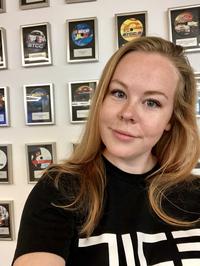Jessica Sollander works with the production of the FIFA-games
Jessica Sollander currently works as a Development Director at Electronic Arts (EA) in Vancouver, Canada. She has two degrees from the School of Business, Economics and Law, a Bachelor's degree from the School’s BSc Logistics programme and a one-year Master's degree from Matix (Management of growth). It is now eight years since she entered the job market and since then she has managed a range of different jobs. Today, she is responsible for a part of the production of the FIFA game.
Who is your current employer?
-Today I work at Electronic Arts (EA) in Vancouver. I got a job at EA in Stockholm and then got the opportunity to transfer to the Vancouver office in the winter of 2019. I got my first job after graduation through Matix, I was hired at the company where I did my internship. I was there for a few years and worked in their offices both in Gothenburg and in Stockholm.
Describe your job, what do you do and what are your responsibilities?
- I am responsible for a part of the production of the FIFA games. I have now worked with game production for 4 years, with several different areas of responsibility. Today, I lead a few teams that work with creating the game and developing new technical solutions. For example, when we create a certain arena, a certain player or a team's football kit I’m responsible for it being produced according to references, agreed with our licensing department, art directors, and for making sure that it meets all technical requirements and that everything is done on time. I get the opportunity to work with many different departments and teams to collaborate and solve problems together. The job is highly intensive, new things happen all the time and decisions can change from one week to the next. This places great demands on communication, reliance, and respect in the team with a positive attitude - we are building games after all! It is also about being able to prioritise, quickly understand what changes mean and come up with new solutions when necessary. All the jobs I've had, all the challenges and all the victories along the way have led up to what I do today.
How did you end up where you are today?
- I've had many jobs since I graduated, most of which I've had for 1.5-2.5 years. During my career, I have explored what I am really good at and what I am passionate about, which has meant that I have grown from one job into the next. I've also had jobs I wasn't particularly good at and that's also an important lesson. Since graduating, I have worked with social media, internal audit, sales, IT processes, accounting, and game development. I've done my best in every job I've had, but some just haven't been a good match. During one period I was a consultant and then tried various types of roles, it was actually my role as a consultant that led up to the job I have today.
How has your education at the School helped your career?
- Currently, I do not work with logistics in the way I imagined when I started studying, but the logistics programme has really taught me to see and understand processes. It didn't have to be warehouse processes because I could still apply the same theories to work processes no matter if it was communication or game development processes. Where are the leaks and wastage? What is the consequence if any step breaks? What is the bullwhip effect after production stops? Being able to see and address these types of problems has been very valuable. The Matix program helped me think about problems in a multifaceted way. We learned that companies require so many different perspectives in collaboration to succeed and it is rarely as simple as a problem being limited to one place or one solution. I also got to see experience from a small business and the passion, sweat and drive required to succeed. Overall, the training has taught me discipline, to write down thoughts and reports in an organized way and to use theories or frameworks when needed. Having discussions using BCG's model, SWOT or ROI calculations has come in handy in unexpected situations.
What did you think was the best thing about being a student at the School?
- For me, the best thing about being a student at the School was being active in the Student Union and working with Handels Consulting. I've built networks, got to practice real work situations and to fail without big things at stake. At the School, I have been able to explore my best and worst sides, I learnt about budgets, presentations, collaboration, leadership and to be true to myself.
Do you have any tips or advice for our students at the School?
- Do something outside of your comfort zone! Join associations or take a course you don't have to take. Give yourself the opportunity to meet other people and expand your perspectives. Work with one of the student union companies and take part of the rich student life Gothenburg has to offer. My involvement in the Student Union and the time at Handels Consulting has been more important to my career than getting the highest grades, but of course it depends on what career you are looking for. If you make the most of your student time, you will find friends for life without a struggle, many of my closest friends are the ones I met at the School. Don't be in such a hurry to find the right job or become a manager right away, almost all companies have interesting positions, and it is more important that you find a job that feels exciting and a manager who believes in you and challenges you, than to find a job at the "right company".
